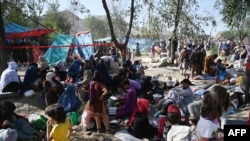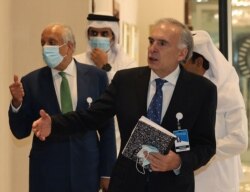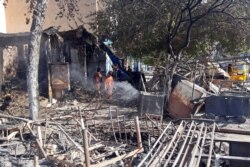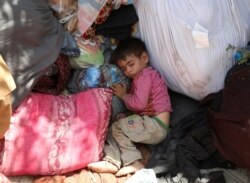The International Committee of the Red Cross said Tuesday its health facilities in Afghanistan have treated more than 4,000 patients wounded by weapons over the past week, an indication of the intensity of the recent Afghan conflict
The violence comes as the United States along with regional and international stakeholders have gathered in Doha, Qatar, to press the Afghan parties to the conflict to urgently seek a negotiated settlement to the South Asian country’s long war.
An ICRC statement called on both Afghan government forces and Taliban insurgents for immediate restraint, stressing that civilians and vital infrastructure such as hospitals must be protected from fighting.
Hundreds of thousands of civilians are at risk as fighting intensifies in and around Kunduz, Lashkar Gah, Kandahar, and other Afghan contested cities, it added.
“Street-to-street clashes in Kunduz, Lashkar Gah and other cities over the last few days have injured hundreds of civilians even as medical services are heavily strained due to damage to health facilities and a lack of staff,” the ICRC said.
Several cities have no electricity, and water supply systems are barely operational in some places.
“We are seeing homes destroyed, medical staff and patients put at tremendous risk, and hospitals, electricity and water infrastructure damage,” said Eloi Fillion, ICRC’s head of delegation in Afghanistan.
Fillion said the use of explosive weapons, such as grenades, rockets, mortars and bombs, in cities is having an indiscriminate impact on the population.
“Many families have no option but to flee in search of a safer place,” he said. “This must stop.”
In July alone, the ICRC said it had helped nearly 13,000 patients suffering from “weapon-related injuries” across Afghanistan.
The international aid agency noted the number appears likely to rise in August as fighting increases in highly populated areas.
The violence comes as regional and international stakeholders Tuesday gathered in Qatar to collectively press representatives of the Afghan parties to the conflict to resume peace talks and urgently reach a political settlement to bring an end to the bloodshed.
Washington said Monday that U.S. special representative for Afghanistan reconciliation, Zalmay Khalilzad, in several planned rounds of meetings this week starting Tuesday in the Qatari capital, Doha, will “help formulate a joint international response to the rapidly deteriorating” situation in Afghanistan.
The U.S. State Department said Khalilzad “will press the Taliban to stop their military offensive and to negotiate a political settlement, which is the only path to stability and development in Afghanistan.”
The Taliban have captured several cities in the last week and threaten many more, raising the prospects for the Islamist group to regain power in Afghanistan.
Washington and representatives of other countries attending the Afghan peace-related meetings in Doha will renew their pledge not to recognize a government in Kabul imposed by force, according to the U.S. statement.
The United Nations warned last month that the Afghan war, in the first six months of this year, showed an almost 50% rise in civilian casualties compared with 2020.








